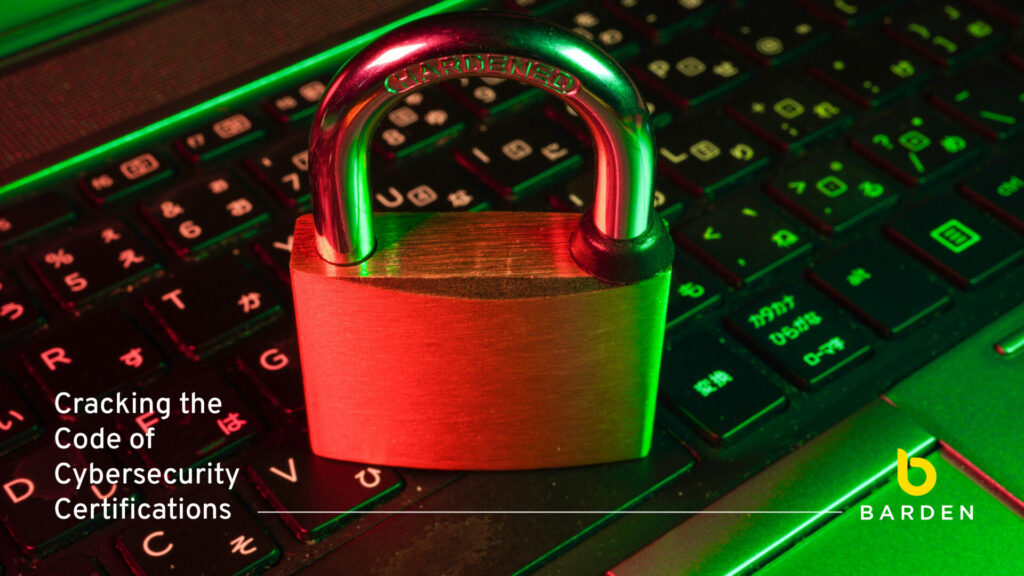In today’s increasingly complex digital world, cybersecurity skills are more in demand than ever. Let’s explore the four key certifications that validate your expertise and position you for long-term success:
Certified Information Systems Security Professional (CISSP)
This globally recognised certification covers areas including risk management, asset security, security engineering, and more.
How to get it:
Before taking the CISSP exam and becoming fully certified, you will need at least five years of full-time, paid work as a security analyst in two or more of the eight domains covered in the CISSP, such as cryptography and software development security.
Why hiring managers value it:
- Proven Skills: Hiring managers look for CISSP certification because it demonstrates the ability to design, implement, and manage a cybersecurity program.
- Technical Expertise: CISSP holders can explain complex topics like security architecture and access control, understand disaster recovery, and possess strong technical skills.
- Leadership Potential: The CISSP signifies a broad understanding of cybersecurity best practices, making CISSP professionals a valuable asset for leadership and senior roles.
CompTIA Security+
This is an entry-level certification that covers fundamental areas of cyber security including threat detection, risk management, cryptography, and network security.
How to get it: This is a one-exam certification. Candidates need to pass a test that combines multiple-choice and performance-based questions.
Why hiring managers value it:
- Security Fundamentals: Hiring managers see CompTIA Security+ as proof that you have a solid grasp of cybersecurity essentials.
- Entry-Level Ready: Many entry-level cybersecurity jobs require or highly value this certification.
- Cybersecurity Awareness: CompTIA Security+ demonstrates a foundational understanding of cybersecurity best practices and principles.
CEH (Certified Ethical Hacker)
The CEH certification validates your skills in ethical hacking – the legal practice of identifying and exploiting vulnerabilities in computer systems to improve their security.
How to get it: This certification requires either two years of information security experience or completion of an official training course. After meeting the eligibility criteria, you can take the CEH exam.
Why hiring managers value it:
- Vulnerability Detection: CEH holders are skilled at finding weaknesses in systems and networks before malicious actors can exploit them.
- Penetration Testing: This certification demonstrates practical abilities in penetration testing and ethical hacking techniques.
- Security Strategist: A CEH sets you apart by showcasing your ability to think like a hacker and proactively address security threats. You will be seen as someone who goes beyond following established protocols to stay ahead of cyber adversaries.
CISM (Certified Information Security Manager)
The CISM certification validates your expertise in information security management. It demonstrates your ability to assess risks, develop effective governance strategies, and proactively address security incidents. This certification is particularly relevant for those interested in emerging technologies like AI and blockchain, ensuring your skillset stays ahead of evolving threats and industry demands.
How to get it:
Before undertaking the certification exam, Candidates must have a minimum of five years of professional information systems auditing, control, or security work experience.
Why hiring managers value it:
- Security Leadership: CISM holders demonstrate the ability to manage and oversee the strategic aspects of an organisation’s cybersecurity program.
- Business Alignment: You will be recognised for your understanding of how to align security initiatives with business goals and effectively manage security risks.
- Commitment & Expertise: CISM’s challenging nature signifies your dedication to information security and your career progression. This can translate into increased job opportunities and higher earning potential.
Check out our other blogs in this series:
The Top 5 Cybersecurity Skillset to Build a Bulletproof Defence >>>>
Understanding the Complete Cybersecurity Cycle >>>>
More about Lorraine…
Lorraine O’Leary is a Senior Associate in the Infrastructure & Security division of Barden’s talent advisory and recruitment firm.
Graduating with First Class Honours in BSc Business Information Systems from UCC, Lorraine’s academic aptitude for technology laid a solid foundation for her career trajectory. In February 2021, she joined the Barden team and has been a driving force behind the growth of the emergent technology practice within Barden, contributing significantly from its inception.
In her role, Lorraine serves as a trusted advisor to technology professionals and clients, providing guidance and unbiased advice throughout their careers. In particular, she works directly with infrastructure and security professionals throughout Ireland. Connect with Lorraine on LinkedIn or via lorraine.oleary@barden.ie


 Jump Back
Jump Back

